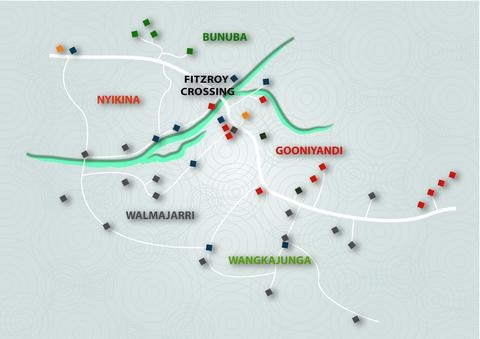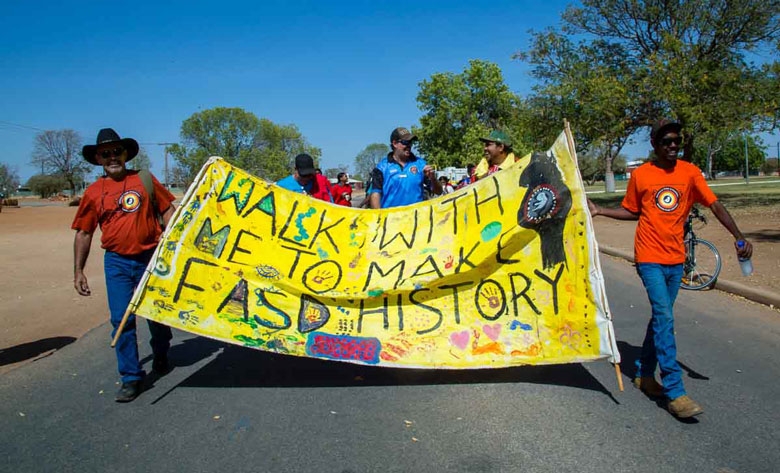Strengthening lililwans and bigiswun kids
Marninwarntikura Fitzroy Women’s Resource Centre (Aboriginal Corporation)’s strategic work is sustaining women of the Fitzroy Valley—and strengthening future generations.

Language groups of the Fitzroy Valley
Fitzroy Crossing, Western Australia: For 30 years, courageous women of the Fitzroy Valley have cultivated a strong corporation to provide relief and support to Aboriginal women. Founded to support women struggling in the face of family violence, it was also always about boosting women’s independence, sustaining Aboriginal cultures, and building trust and friendship among and beyond the membership. And through a high-impact collaborative project on foetal alcohol syndrome disorders (FASD), the corporation is working to protect and strengthen future generations.
Marninwarntikura’s board includes women from each of the main language groups of the Fitzroy Valley—Bunuba, Gooniyandi, Walmajarri and Wangkatjungka. Funding for its programs comes from state and federal government departments, philanthropic organisations and donations.The corporation serves Fitzroy Valley women and their families by encouraging safety and well-being and fostering leadership and financial independence. Its services include activities, mentoring, support and advocacy.
When she was CEO, June Oscar AO described the origins of the corporation, and the vision of its founders, as follows:
In the mid-1980s these women came together. They had experienced the horror of family violence and felt the destructive effects of excessive alcohol consumption. The women were determined through their voices to shape a healthier society around wellbeing and care.
With strong governance underpinning the operation, all the services are culturally sensitive and respectful. To ensure its values and vision stay strong, the corporation rule book requires new directors to undergo induction training to be sure they understand:
- the corporation’s purpose
- the role and responsibilities of directors and
- how to be a shared decision maker.
Marninwarntikura’s number 1 strategic priority is ‘Making FASD history’. FASD is a global problem. Alcohol damages foetal brains. The more alcohol the mother consumes during her pregnancy, the more her baby’s brain is damaged.
Ten years ago Marninwarntikura partnered with University of Sydney researchers to study the extent of impact of FASD on local children. They called their study ‘Lililwan’ (little one in Kimberley Kriol), and it was groundbreaking in providing concrete data about a local population, as well as for being community-led. Emily Carter, the current CEO of Marninwarntikura, explains how it came about:
Women of Fitzroy Valley had already called for alcohol restrictions in the area. Grandmothers had noticed that some of their grandchildren’s behaviour was different from that of their own children.
The families of almost every child born in the region between 2002 and 2004 agreed to participate in the study. Worryingly, the research revealed that 55% of children were affected by alcohol in utero, and that 20% met the criteria for FASD.

Marninwarntikura marches for for International FASD Awareness Day on 9 September every year
A key outcome of Lililwan was the Marulu strategy, to:
- support families to care for children with early life trauma (ELT) and complex needs
- encourage more coordination and collaboration between the services that diagnose and respond.
Health and education plans were created for the affected children, and public awareness campaigns have been hugely beneficial in raising awareness. But Marninwarntikura had limited capacity to provide all the support that was needed for all the children, and many have struggled with mental health issues and been detained in the justice system.

Members of the Marulu team
Last year, the corporation embarked on a follow-up study, again with Sydney University, to revisit the Lililwan cohort now they are on the verge of adulthood. This project is called ‘Bigiswun Kid’ (biggest one kid) and it is providing valuable knowledge about what has helped them over the years, and what they now need.
Marmingee Hand cared for grandchildren affected by FASD, so she has a deep understanding of the challenges and needs. Now chair of Marninwarntikura, she has a clear view of potential solutions:
Our communities have survived multiple, complex traumas and all of those traumas have caused harm. FASD is one of the worst effects, so it’s important to understand it. Lililwan and now Bigiswun Kid are crucial in helping us to understand how best to support women and children. There are many ways we can help so that we can heal and start to again flourish.
At the core of the Marulu strategy, as for all of Marninwarntikura’s work, is community leadership and making sure that the community benefits. For bigiswun kids, that means providing whatever help it becomes clear they need:
- help to get a birth certificate
- help to apply for Centrelink or to join a Community Development Program
- to go out bush hunting.
Clearly, health issues are connected to many other issues in a person’s life. As Marmingee Hand says:
One big problem for these kids is that it’s hard for them to learn. And that’s a problem for us, culturally. We need them to know and practice culture so our culture stays strong.
Marninwarntikura’s research projects have succeeded because they are community-led, and the university researchers have understood and respected that imperative. Marmingee Hand continues:
We’re very proud of our partnership with Sydney University because our projects haven’t just created new knowledge; they’ve been good for community. The researchers have taken the time to understand our lives; and we have made decisions together.
It’s always good to hear of a genuine partnership between a university and an Aboriginal corporation. Given that in this case, the future of a whole region is at stake, it’s wonderful to know there are strong, savvy women driving the work. Congratulations, directors and staff of Marninwarntikura Fitzroy Women’s Resource Centre (Aboriginal Corporation).